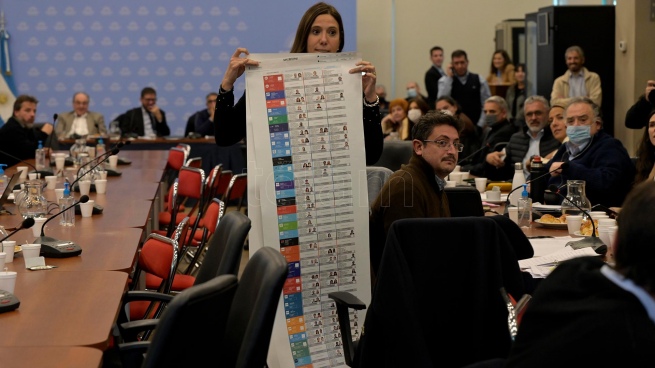The plenary session of the Justice, Constitutional Affairs and Budget commissions of the Chamber of Deputies issued this Tuesday a majority opinion promoted by opposition blocs to implement the Single Paper Ballot system for the elections of the President of the Nation and national legislators, while the Front of All presented another to reject the initiative.
Together for Change, the Federal Interblock and Together for Río Negro gathered 58 signatures in the three commissions on this electoral system, while the Front of All obtained 57 signatures against the Single Ballot.
Now the opposition is considering requesting a special session for June 8 or 15 to deal with this majority office, which will need 129 affirmative votes to approve it. With these three blocks they add up to 126 votes, with which if they add the four right-wing deputies they will reach 130.
The meeting was chaired by the heads of the commissions – the ruling party members Rodolfo Tailhade, Hernán Pérez Araujo and Carlos Heller – and began with a report by the deputy of the Pro Silvia Lospenatto, who detailed aspects of the opinion promoted by the majority of the opposition groups.
Lospenatto said that the consensus opinion by Together for Change (JxC), the Federal Interblock and Together for Río Negro is similar to the single ballot system used in Córdoba, “where all the categories that are at stake at the national level are recorded. and only every four years will all categories be seen”.
From the ruling party, deputy Paula Pennaca affirmed that “We agree to discuss, to improve the rules that allow each citizen to exercise their right to vote, but not in an untimely manner, with little debate and with little time to implement it.”
He pointed out that in 2013 the single electronic ballot was approved in the city of Buenos Aires and in 2015 it was “the last time it was used”, and in the successive elections “there was no choice in any election for the single paper or electronic ballot” and he recalled that in 2015 the radical Martín Lousteau “denounced fraud”.
Pennaca said that “if you want transparency, take care of the candidates, they will be hidden on this ballot so that they can go to justice” and asked the opposition to get together to vote on “the other laws that benefit citizens.”
For his part, Lospenatto said that “we came to this plenary session after doing what Argentine society demands of us as a political leadership: building a great consensus. The common goal is to improve our democratic system and the single ballot points to that,” he added.
He said that the opinion “includes in the general vote the option of the complete list for a group” and that “we have chosen to show the first five names on the list and that will allow 20 provinces to have the complete offer.”
In addition, he pointed out that it was decided “to allow mail by electronic vote for citizens who are abroad”as it was in force until 2019. He also explained that “we have regulated the possibility that a province can opt for the simultaneity system, but in separate ballots and ballot boxes”
In the commissions that study the issue, only four of the political spaces that make up the Chamber are represented: the FdT, JxC, the Federal interbloc and the Missionary Concord Front, since the D’Hont system by which places are distributed It did not allow for any of the members of the smaller volume blocks to be present.
The position of the Federal interbloc on the subject, from its position as co-promoters of the request for debate, gives it, in the figure of Graciela Camaño, from Buenos Aires, the key signature for the opposition to take advantage of the Constitutional Affairs and Justice commissions.
In the first, the FdT and JxC have 17 members each, and the remaining chair is that of Camaño, as in Justice, where the former national Labor Minister is in charge of unbalancing the 15 representatives held by each of the two major forces.
Budget is the only commission in which the ruling party could get its rejection of the change in the electoral system to prevail, since, of its 49 members, 24 are its own and another bench belongs to the ally of missionary reformism, for which they gather 25, one more than the 24 that the opposition can add between the 23 of JxC and the representative of Córdoba.












